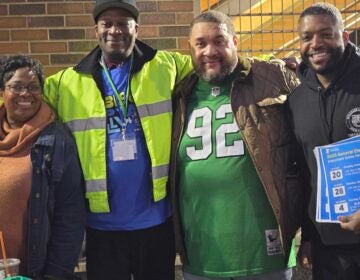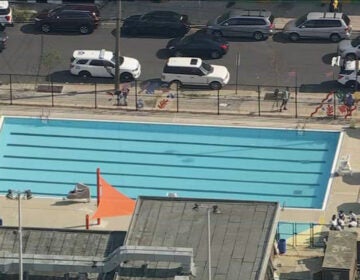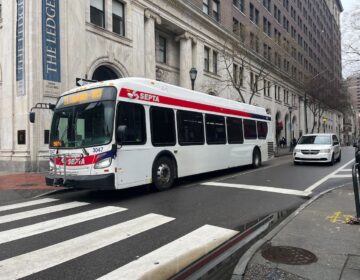‘They are here to stay and they’re fighting’: Lancaster Avenue is pulling together to survive
Small businesses on Lancaster Avenue northwest of University City are supporting one another as they work to move past the struggles of 2020.
Listen 1:19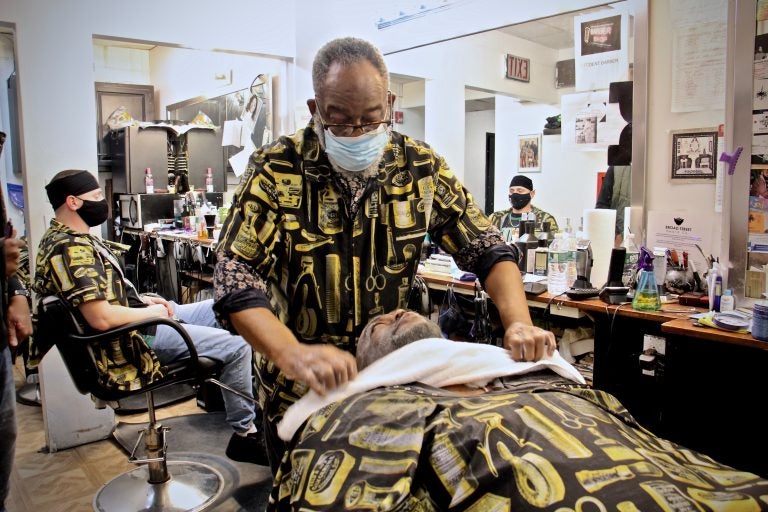
Leroy Robinson Jr. tends to a customer at Leroy's Barbershop on Lancaster Avenue. (Emma Lee/WHYY)
Morton Smith, affectionately known as Mr. Morty, opened Eagle Jewelry & Loan Co in West Philadelphia on Lancaster Avenue more than 40 years ago.
Smith grew up on 40th and Poplar, so the area is also his home.
Eagle is a pawn shop, a check-cashing place, a notary, and a place to send out mail. The small business at the intersection of Lancaster and 42nd, on the border of Belmont and Mill Creek, has always employed people from the community. Before the pandemic, neighbors knew it as the place to go if you needed money quickly to pay bills.
Walking inside, photographs hang on the wall like a family photo album. Some people grow up over the course of several photos — former employees and their children as well as neighbors.
“I’ve been here a long time,” Smith said. “I’ve married people here.”
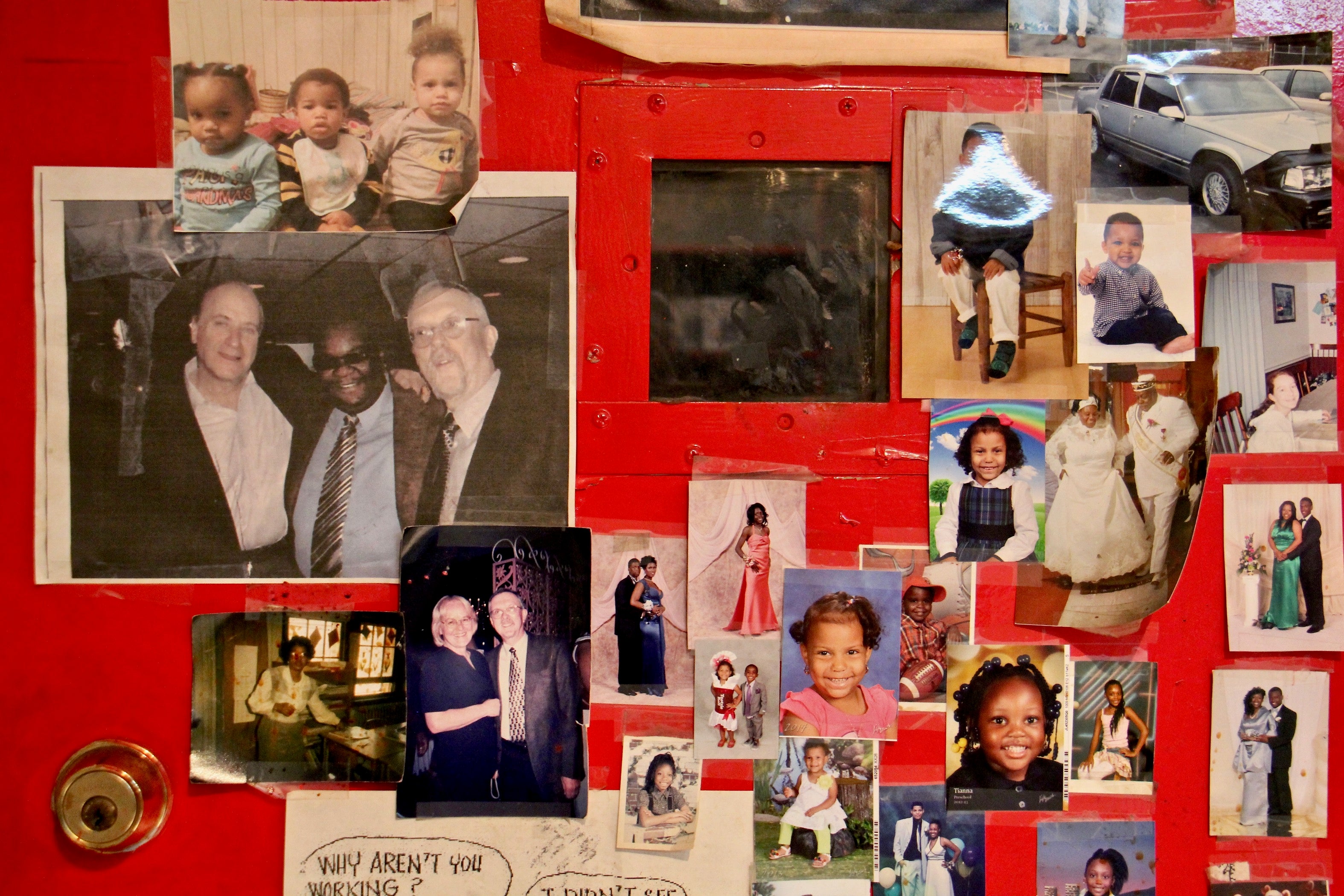
Mr. Morty’s shop has long played a big role in the life of his West Philadelphia community. Lancaster Avenue serves as the area’s commercial spine, yet no other banks or postal service providers operate on the shop-lined street. The closest post office and bank are about a mile away.
Councilmember Jamie Gauthier described Smith’s shop as a community service, particularly in a part of the city where racism, divestment, and poverty have left residents without the private amenities and public infrastructure that people in more affluent areas take for granted.
“I don’t know that most folks would think about a pawn shop, and think about how important that is in a community,” Gauthier said. “In this community which is underbanked, that is a critically important service.”
Smith closed his doors last March because of the pandemic shutdowns. That in itself was a major financial blow, but the veteran business owner expected to reopen in June.
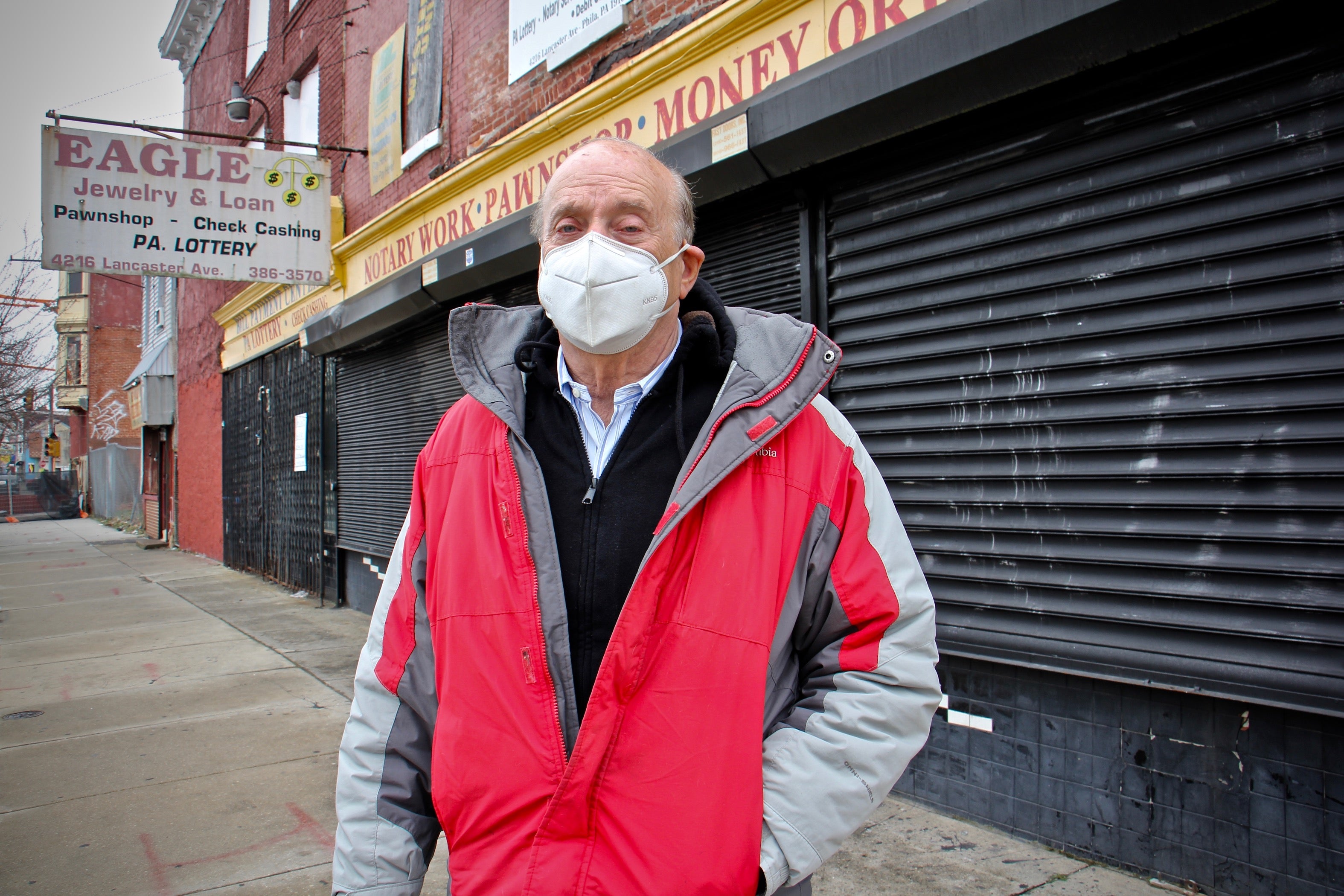
But on May 31, protests erupted and his pawn shop took a hit. Most of his inventory was stolen and couldn’t be replaced since it’s all second-hand merchandise. Smith’s insurance didn’t cover the losses.
“I haven’t been doing much since,” he said. “I want to come back.”
He applied for government aid but hasn’t had any luck. He still comes by to his building and talks to neighboring business owners. Lancaster Avenue is his community and he wants to stay connected. He aspires to open up again.
“I don’t know how, but I will,” Smith said.
He is one of the 30 businesses that had to shutter its doors on the corridor out of roughly 180. Like many on the commercial corridor northwest of University City, Smith hopes that he will rebound — and he is relying on his neighbors after other systems have failed him.
“I get calls every day about us reopening,” he said. “I know I’ll have business if I re-open. I have a great relationship with the community, this is my community.”
‘We support each other’
Leroy Robinson Jr., 63, has owned Leroy’s Barbershop for eight years, but has been cutting hair for over 45. Robinson went to Eagle at least twice a month to send faxes or get money orders.
“On a scale of one to 10, on how important the pawn shop was to the community, it was a 10,” he said. “You could do about anything there that was about finance and on top of that, you could pawn off a gold ring so you could pay your telephone bill.”
In particular, he worries about how eldely people in the neighborhood will survive without Smith’s shop. So many of them rely on it as the place to go for social security and pension checks, he explained, especially those without reliable transportation.
Shawntay Harrigan, who grew up two blocks away from the corridor, owns Triple S Hair Lounge, a few doors down from the pawn shop.
Harrigan grew up with the business.
“For about 39 years, my mom has been using that pawn shop [for] check-cashing, notaries, pawning items when we needed to pay bills, [and] buying items when we couldn’t afford to go to a regular store for computers,” she said. “It’s a big asset for this community and a multi-functioning business for everybody.”
Before the pandemic, Harrigan said her business was thriving and was able to hire four people to help out with the salon. But when non-essential businesses were forced to shut down, she was forced to figure out how to survive without income for four months. She was able to open back up in July, but business still hasn’t bounced back. She’s used to serving 40 people a day but that has dwindled to barely 10.
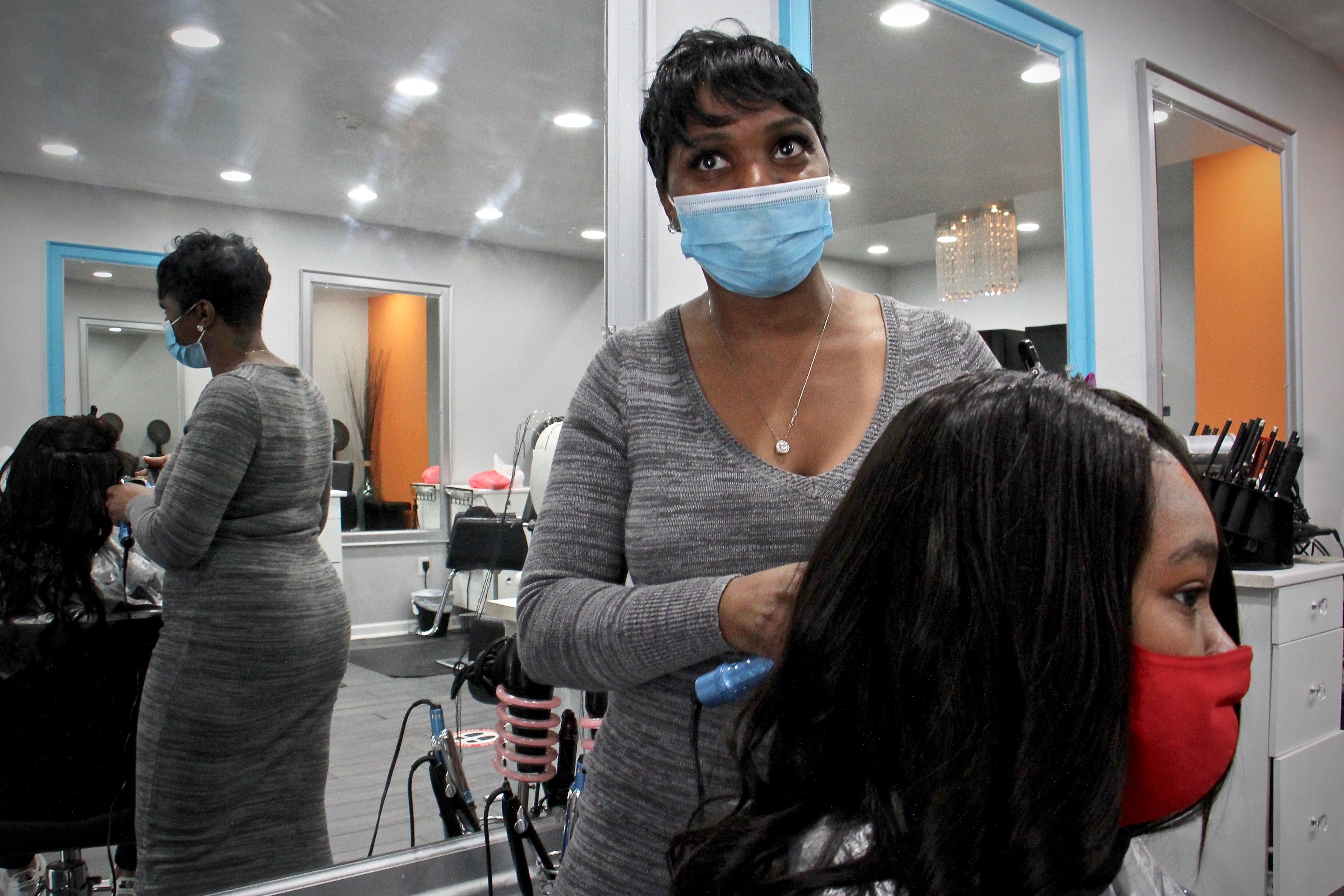
“It hurt our clientele a lot,” she said. “A lot of clients still haven’t returned. We’re down still about 60%.”
Harrigan did receive an Emergency Relief Loan, but she described it as just enough to pay the salon’s mortgage. She was still behind on utilities. She applied for the federal Paycheck Protection Program but was denied.
Her story is similar to that of many of the businesses on the block. Few were successful with programs such as the Local Initiatives Support Corporation (LISC) and the Merchant Fund. Even when business owners were able to access aid, it only kept them afloat, according to Dante Leonard, the commercial corridor manager.
The only thing left to do was to rely on each other.
The morning after the first round of social unrest, the business owners got together at 4 a.m. to begin boarding up storefronts and helping each other understand how to navigate insurance.
“For us to be shut down during COVID-19 and then the looting happening, it was a double whammy,” Harrigan said. “We were losing not once, but twice.”
Some stores took longer to rebuild than others, so for much of the summer, it was common to share space until repairs could be done. It was also common to hire each other temporarily while folks were getting back on their feet. Also, there was a loose agreement to refer clients to each other’s businesses. In Harrigan’s case, that meant telling her clients to frequent beauty supply stores nearby.
“We support each other,” she said.
Mary Barnes, also from the area, owns MAPE Printing & Signs and has run her business on Lancaster Avenue for five years. She applied for both city and federal aid but to no avail. Still, she’s in good spirits.
“I’m 100% confident this will survive because I give 100% of my all,” she said.
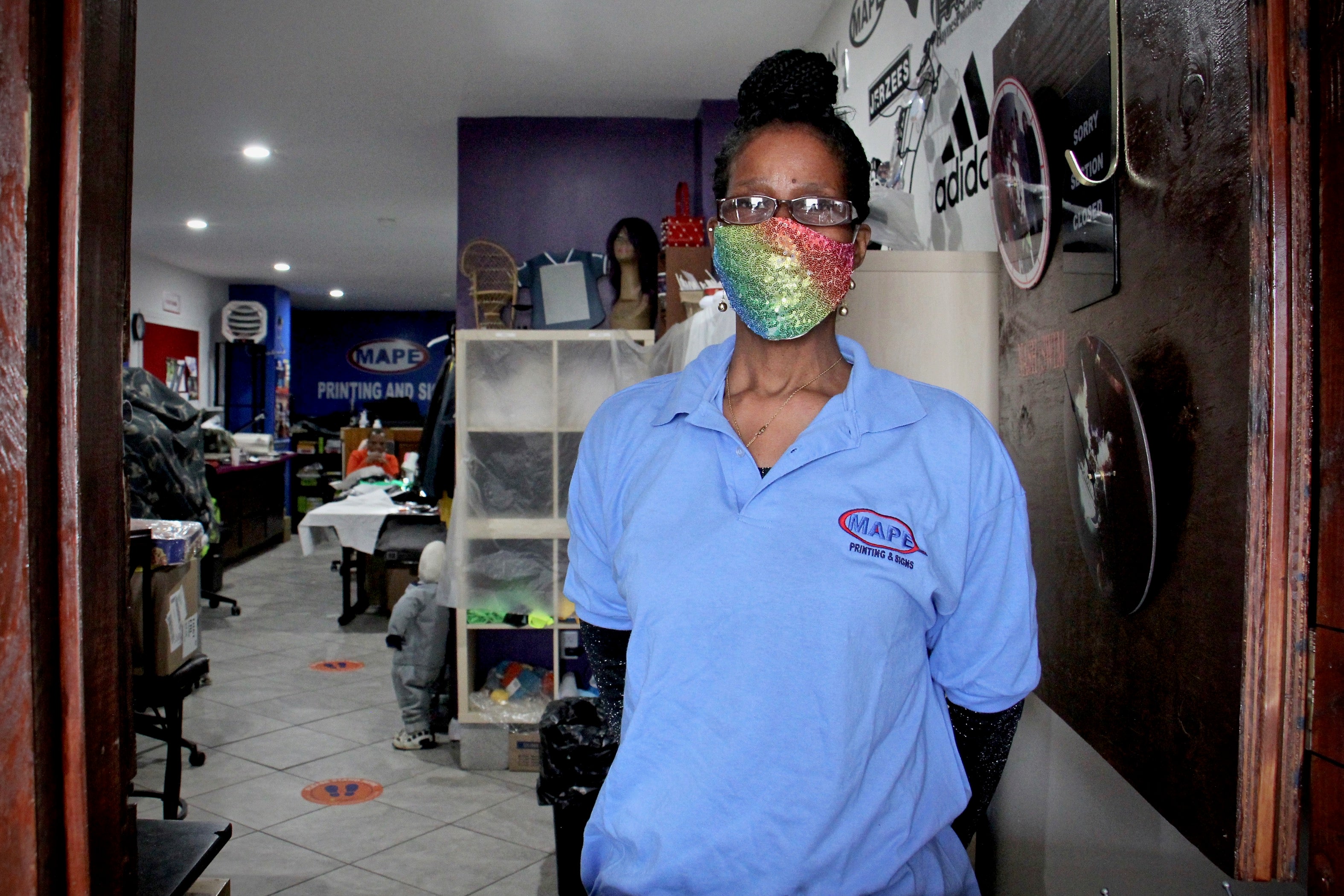
Last month, Barnes filled the back of her truck with food donated by a church and rode the avenue giving away meals to anybody who wanted one. She’s planning to make the giveaway a monthly occurrence.
“We do help each other out,” she said. “It’s still slow and everybody is still working hard trying to get their business up and running but if anyone needs help, we’re there for each other.”
Gauthier said she’s working on getting more funds out to small businesses in her district — there are hundreds of them on neighborhood streets, and along the five commercial corridors in her district, and many are struggling.
“I’ve also been advocating that we need more money, more free and clear cash [for] small businesses to be able to get them through this time,” Gauthier said.
She hopes the Neighborhood Preservation Initiative — the $400-million plan designed to invest in affordable housing, alleviating poverty, and jobs — will turn into additional aid for all her corridors, but for the Lancaster Avenue one in particular.
“It’s certainly a part of why I supported it,” she said. “I’m hopeful that we can get a good amount of funding towards our neighborhood commercial corridors because they are what make up the lifeblood of our neighborhood.”
Gauthier said there are structural hurdles that prevent many under-resourced small businesses from getting aid. Leonard sees this play out in real-time. He said when he talks to businesses about getting aid, many describe the walls they hit. Not everyone has their taxes properly filed, equal access to information, or the ability to navigate forms. Others don’t qualify because of the size of their enterprise or the way they have registered the business.
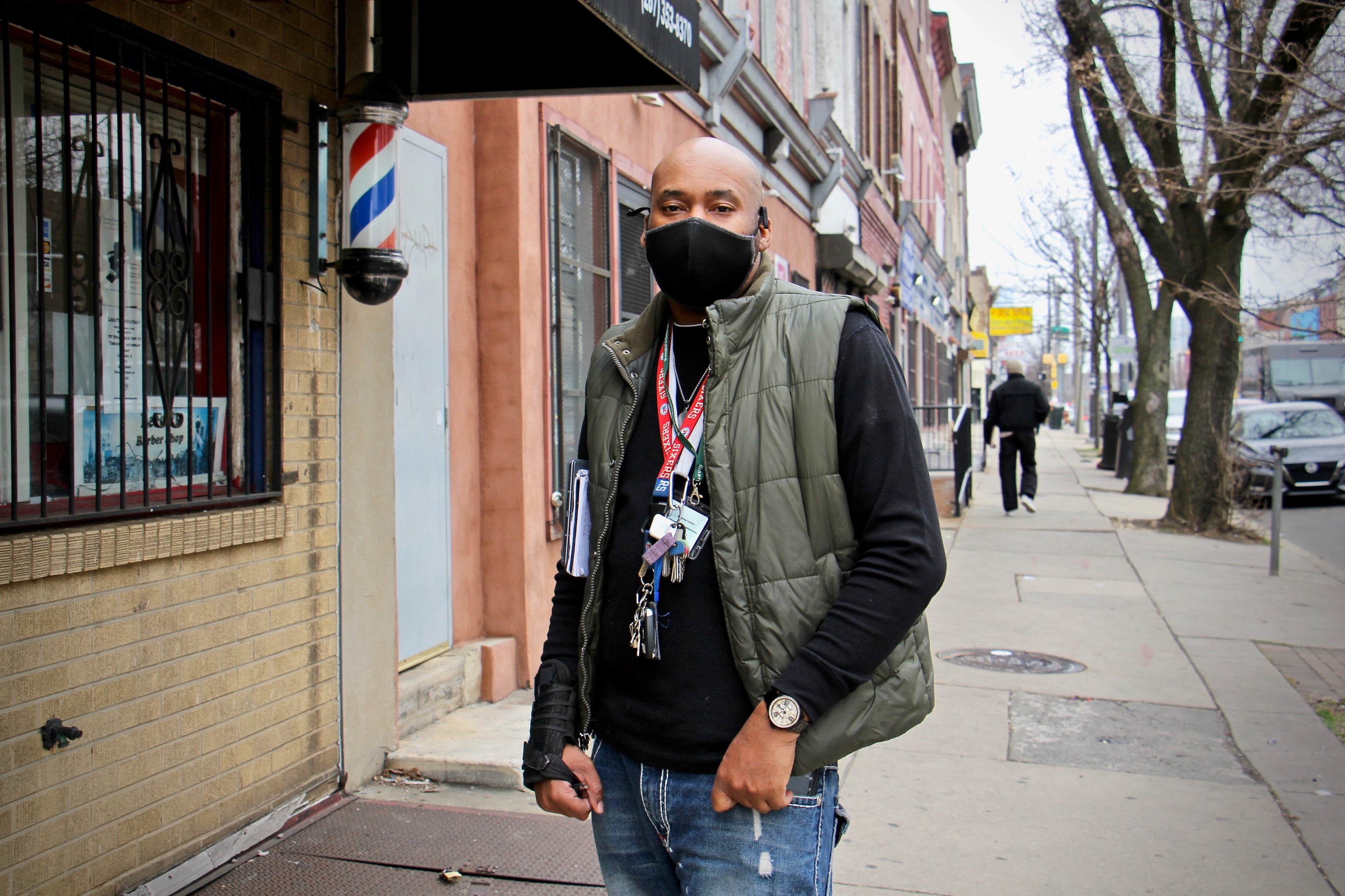
“No one knew this was going to happen so they didn’t put themselves in the right position to take advantage,” Leonard said.
Despite this, Leonard said the corridor is still powering through.
“They’re hopeful and they’re pleasant,” he said. “There’s not a lot of dejected spirits. They are here to stay and they’re fighting.”
According to Gauthier, the programs that work the best are the ones with quick applications, quick disbursement, and the fewest guidelines on how the money should be spent.
“We need programs that are as flexible as possible,” she said.
In the meantime, Smith still walks the corridor to see his neighbors, waiting for the next opportunity to open. When he can secure funds, he knows his neighbors will be ready to help him set up.
 WHYY is one of over 20 news organizations producing Broke in Philly, a collaborative reporting project on solutions to poverty and the city’s push towards economic justice. Follow us at @BrokeInPhilly.
WHYY is one of over 20 news organizations producing Broke in Philly, a collaborative reporting project on solutions to poverty and the city’s push towards economic justice. Follow us at @BrokeInPhilly.

Subscribe to PlanPhilly
WHYY is your source for fact-based, in-depth journalism and information. As a nonprofit organization, we rely on financial support from readers like you. Please give today.



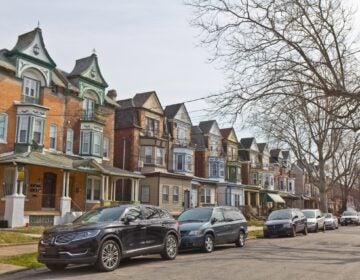
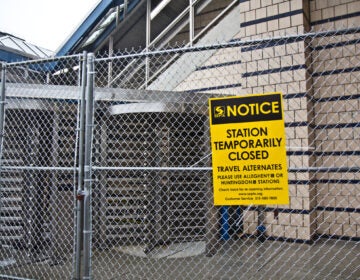

![CoronavirusPandemic_1024x512[1]](https://whyy.org/wp-content/uploads/2020/03/CoronavirusPandemic_1024x5121-300x150.jpg)
